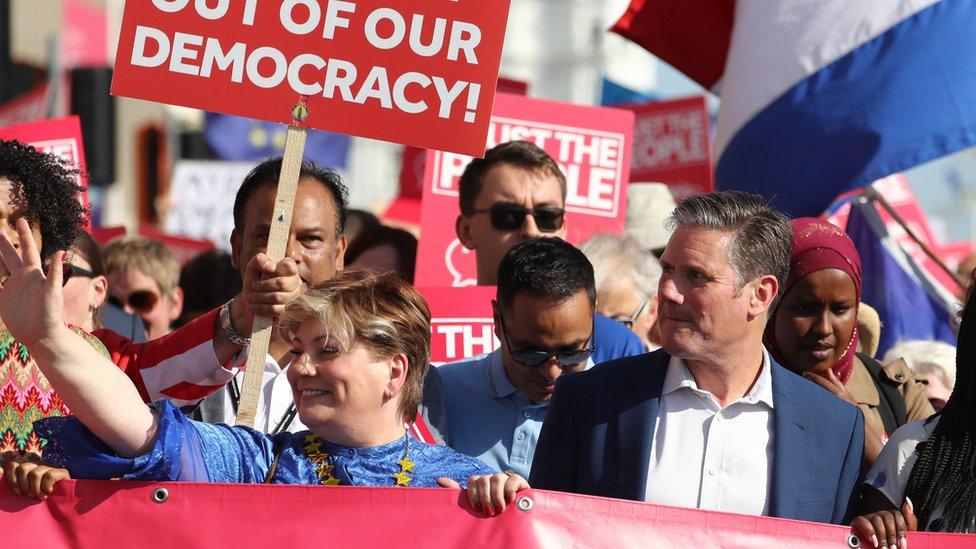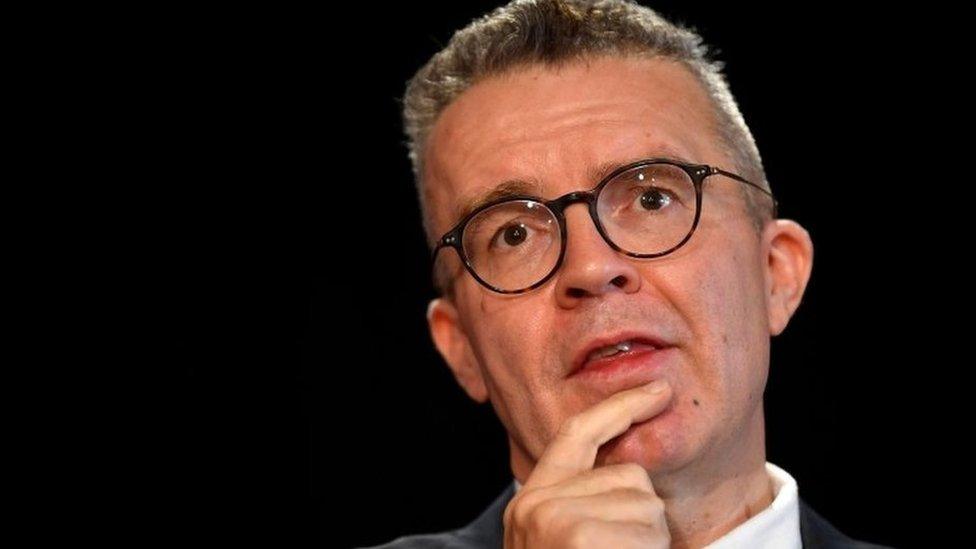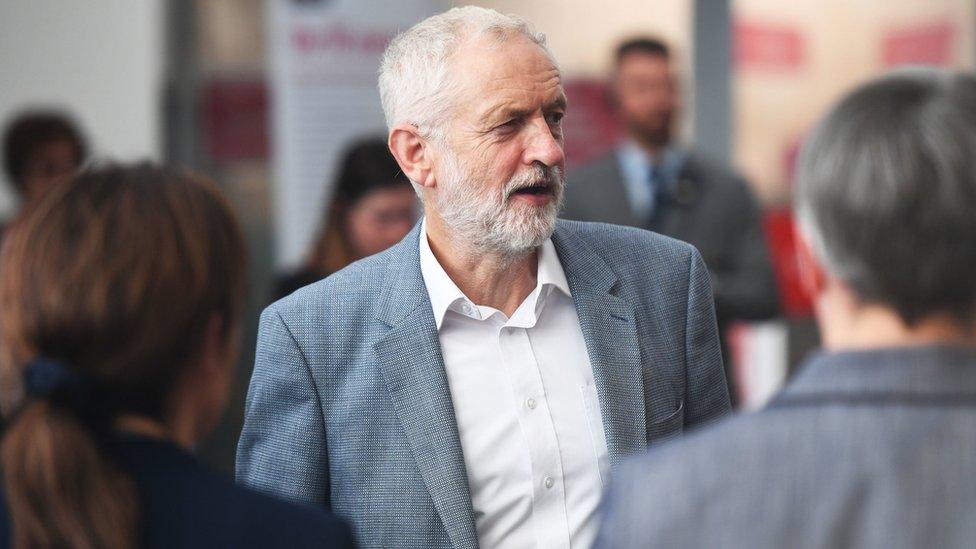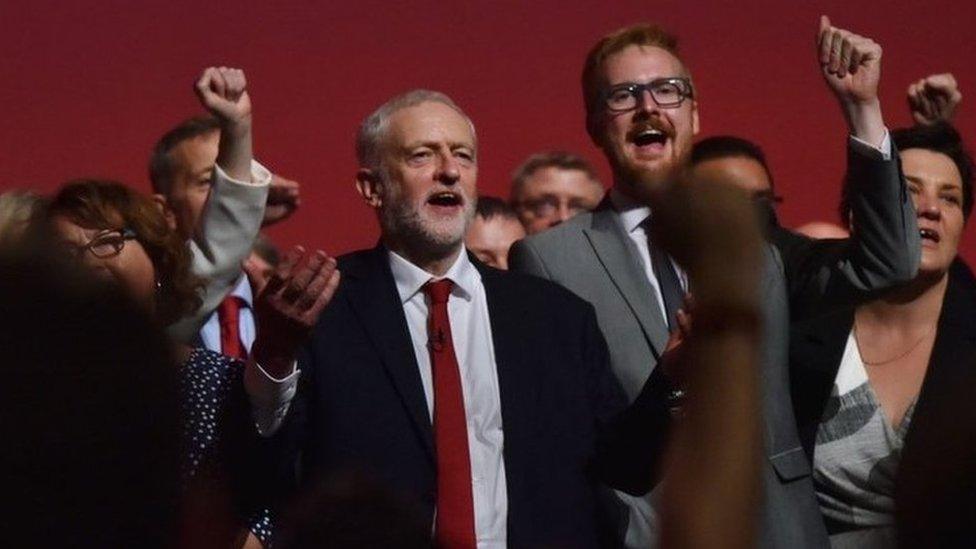Labour conference: Move to abolish deputy post ditched
- Published
Tom Watson speaks to Radio 4's Today programme about the bid to oust him as deputy Labour leader
Labour leader Jeremy Corbyn has quashed a motion at his party conference to oust his deputy, Tom Watson, by abolishing the position.
Mr Corbyn suggested the role should be reviewed instead, and was backed by the ruling National Executive Committee, a Labour source said.
A group of Labour MPs had urged the NEC to avoid an "internal civil war" when it should be preparing for an election.
Mr Watson called the move to oust him a "sectarian attack" on a "broad church".
The party conference, which is being held in Brighton, opened on Saturday and will also see debate on other proposals, including Labour's stance on Brexit.
Meanwhile, Labour frontbenchers Sir Keir Starmer and Emily Thornberry appeared at a rally for the People's Vote campaign, which supports another referendum, and confirmed they would back Remain.
'Rather abolish me than debate'
Speaking ahead of the party conference in Brighton, Mr Watson told the BBC he found out late on Friday in a text message that a motion had been tabled by Jon Lansman, founder of Labour grassroots group Momentum.
He said he felt Mr Lansman "and his faction" were so angry with him over his calls for Labour to "unequivocally back remain" and have another public vote on Brexit, that they would "rather abolish me than have a debate about it".
After his intervention, Mr Corbyn told reporters outside the conference centre that he "enjoyed" working with Mr Watson.
He later said: "The NEC agreed this [Saturday] morning that we are going to consult on the future of diversifying the deputy leadership position to reflect the diversity of our society.
"And the conference will move on to defeating austerity, to the green industrial revolution, green new deal that we are putting forward and giving the people a final say on Brexit."
Mr Lansman said he fully supported Mr Corbyn's proposal to review the deputy leader post.
"We need to make sure the role is properly accountable to the membership while also unifying the party at conference. In my view, this review is absolutely the best way of doing that," he said.
Jeremy Corbyn fields reporters' questions as he arrives at the Labour party conference
Shadow Brexit secretary Sir Keir Starmer said he was "disappointed" at the attempt to oust Mr Watson, and was "glad" it had been stopped.
"I think it's been dealt with, it's been withdrawn swiftly," he told the BBC.
"What we need to do now is to move on to discuss the policies and the programme that we need going into a general election."

Analysis
By BBC political correspondent Iain Watson
The seeds of the current rows overshadowing the first day of Labour conference were sown here in Brighton nearly two weeks ago
Jeremy Corbyn thought he had sealed a deal on Brexit behind closed doors at the TUC conference with the big unions.
The party would officially stay neutral during the election.
But Tom Watson outraged many on the left less than 24 hours later when he contradicted Mr Corbyn and called for an unambiguous campaign to remain.
Many on the left already regarded him as disloyal and this was the final straw. There was mutterings of disciplining him but angry words only turned in to action last night.
Some of Mr Corbyn's closest colleagues have told me they were angry that they hadn't been told of the plot to oust him and the Labour leader himself had to call off the coup.
But the incident exposes Labour's deep fault lines just ahead of an election - not just between left and right but within the left.
Tom Watson's anti-Brexit stance meant that the left-led TSSA union which has campaigned for Remain, rallied to the deputy leader and not Momentum's Jon Lansman.
But when the deputy leader's post is reviewed, these divisions are likely to reopen.
In the short term, Labour's strategy of denouncing the Lib Dems as undemocratic over Brexit and the Conservative as intolerant towards dissenters has been shattered.

The row over Mr Watson's position threatened to overshadow Labour's party conference.
On Saturday morning, in an interview on BBC's Today programme, Mr Watson said the move by Momentum was "moving us into a different kind of institution where pluralism isn't tolerated".
He went on to appeal to Momentum activists to focus on showing people they were serious about changing the political economy of Britain rather than having "a sort of sleight-of-hand constitutional change to do a drive-by shooting of someone you disagree with".

Shadow foreign secretary Emily Thornberry and shadow Brexit secretary Sir Keir Starmer attended the People's Vote rally
Shortly after, the Parliamentary Labour Party (PLP), which represents Labour backbenchers, wrote a letter to members of the National Executive Committee - including Mr Corbyn - saying the move was counterproductive and sent the country a message "we are more interested in internal battles" than constituents' lives.
Former Prime Minister Tony Blair, who led Labour from 1994 to 2007, said abolishing the deputy leader post would be "undemocratic and politically dangerous".
Dawn Butler, shadow women and equalities secretary, said Momentum's move had "come out of the blue" but she could understand the frustration with the deputy leader who had not been seen at shadow cabinet meetings "for a while".
- Published11 September 2019

- Published11 September 2019

- Published21 September 2019
